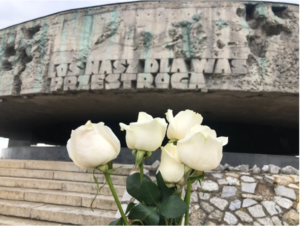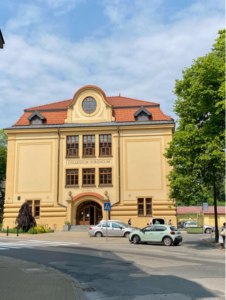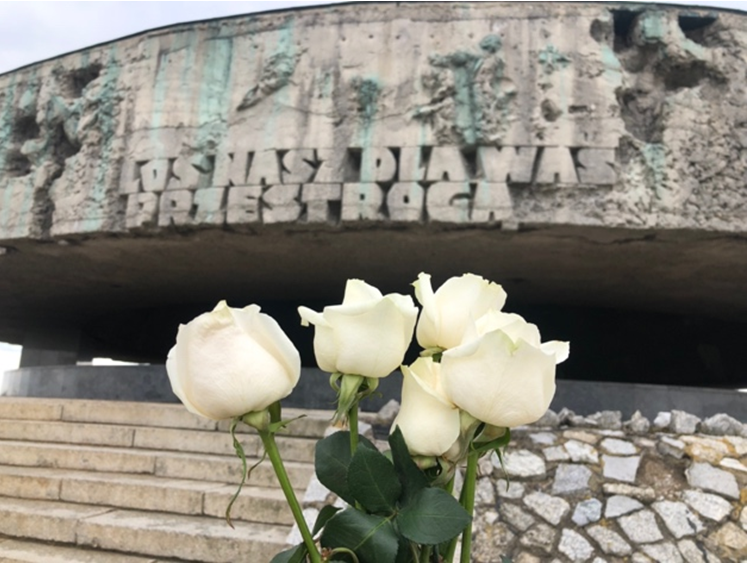How learning about the Holocaust led to an expedition across the world and impactful life lessons
“What are you doing in Poland?”
I am asked this at least once a week by people both in and outside Poland. It seems strange that an American with absolutely no Polish ties would opt to live nonetheless in the 9th largest town in Poland.
Prior to this move, I spent three eye-opening months in Israel for a Jewish-Christian relations fellowship. An Orthodox Jewish woman, Dr. Faydra Shapiro, led us (a small group of American Christians) in learning more about the history between our faiths as well as exploring the hope for a brighter future. These months were filled with many deep and challenging discussions. Many of our conversations would return to the tragedy of the Shoah (the Holocaust).

I found it particularly startling to learn that many Jews are of the perspective that the Holocaust was something Christians had perpetrated against their Jewish neighbours. I had always associated the Shoah with Nazi Germany; the Christianity in which I was raised and with which I was familiar with would have never condoned the Shoah.
Dr. Shapiro further explained that, for centuries, Europe had been the epicentre of Christianity and Jews were the minority. Therefore, Jewish security was always in the hands of the Christians in power. She also explained how Judaism is a belief and ethnicity whereas Christianity is belief-based. As a result, from a Jewish perspective someone born in a Christian family could be perceived as Christian even if they never professed belief in Christianity. It challenged me to think in completely different spheres.
Upon returning to the States, friends and family would ask me, “What did you learn in Israel?” I could not share my experience without discussing the Shoah. It profoundly struck a chord within me. However, I had never even visited a concentration camp. I had grown up hearing about them, reading about them, and even learning about my great grandfather who was a World War II bombardier completing over 73 missions (most did not complete more than 25) of which two missions involved being tasked with killing Hitler.
But somehow it all seemed quite distant. It was time for me to descend into the depths of this evil history, pay respects, and learn. The best way to learn about something is to go there and confront it.
Three years ago, I packed my bags and moved to Poland, to complete a university degree while dedicating my free time to trying to better understand how the atrocities of the Shoah could have happened and how Christian theology and history could have impacted Christian involvement.

I spent my first month in Poland living in Krakow where I dived right in. This included Jewish tours of Krakow, Auschwitz, and Schindler’s factory. I also mixed in some lighter activities like trying the delicious new foods of the country (żurek became an instant favourite).
As this initial month came to a close, I packed up again and hopped into a car to begin the next adventure– moving to Lublin. About an hour after arriving to Lublin, before even moving into housing, I had a Zoom interview with Artza, a Jewish Israeli start-up founded in the pandemic to help support small businesses across Israel as tourism had stopped. Artza curates items from the small businesses into a subscription box for American Christians who love Israel and want to support artisans and business owners in the Land.
On that day I moved to Lublin, I accepted the job. Though I didn’t realise it at the moment, this job would become especially meaningful to me while I live in Poland, particularly as would continue to delve deeper into the heavy history surrounding me.
My first visit to Memorial Museum of the former Nazi concentration camp, Majdanek, was in the spring of 2021 where I discovered something that would also greatly shape my entire time in Lublin. The Catholic University of Lublin’s law building (Collegium Iuridicum at Spokojna 1) was the former SS Headquarters for Operation Reinhardt. This operation sought to eradicate all Jews in the General Government.
In the end the operation murdered 1.7 million Jews. Due to the pandemic, I had not yet had classes in this building; however, months later I would regularly attend classes there. Each time I entered, thoughts would float to the back of my mind reminding me of evil that had been carried out in these very walls.
I felt responsible to do something to help with Holocaust commemoration. Therefore, I volunteered at the Brama Grodzka helping with the English translations of the Map of Places Related to Operation Reinhardt. I could not see Lublin the same. I was constantly reminded of the events that took place around each corner, especially the Spokojna 1 building.
I struggled with this balance between remembering the atrocities and the necessity to move forward. I would chat about this with a Jewish friend in Israel who is a descendant of a Lublin survivor. She would regularly remind me of the importance of, while remembering the Shoah, to cultivate life (chai) as the Shoah had sought the exact opposite.
As Dr Edith Eger, a survivor, profoundly states, “We can’t choose to vanish the dark, but we can choose to kindle the light.” How can I kindle light in this dark building today? It was then I realised I was already kindling some light! During class breaks I would open my laptop and respond to some work emails or create a social media post.
It seemed mundane, yet each small work task became filled with meaning and hope. In the same land where Jews were once mass murdered, I can today work on my laptop supporting Jewish life in Israel. Operation Reinhardt tragically resulted in the destruction of so much Jewish life here; however, it certainly did not end the Jewish story. Jewish life continues today, and as a gentile I am honoured to support Jewish life, especially from Lublin.
I will never understand what it is like to have family perish in the Shoah. I will never understand what it is like to have a survivor as a grandparent. However, I can grieve alongside my Jewish friends and consider how I, as a Christian, can take responsibility today for myself and my community to ensure that Christians do our part to defend and support our Jewish friends and neighbours. By these efforts, I have discovered that we truly can all choose to kindle light in the darkest of places.
This article was originally written for KOL Lublin
Original title: Kindling Light in a Former SS Building
By: Holly Kemph


